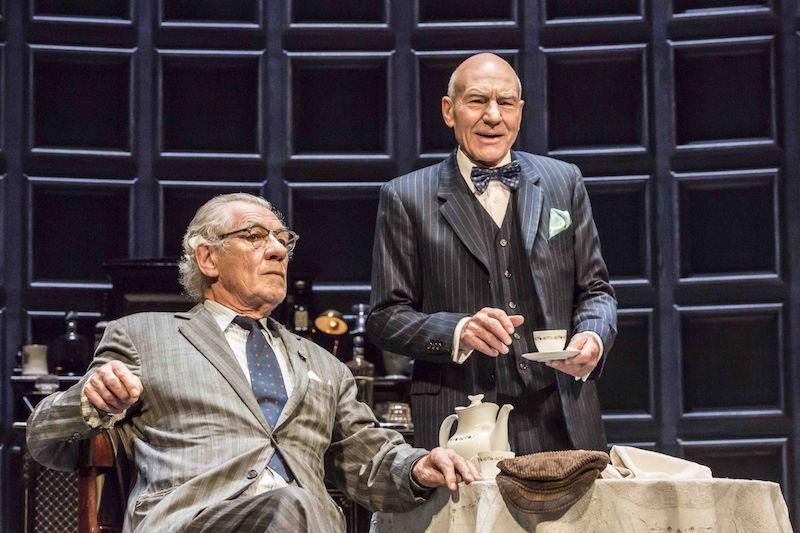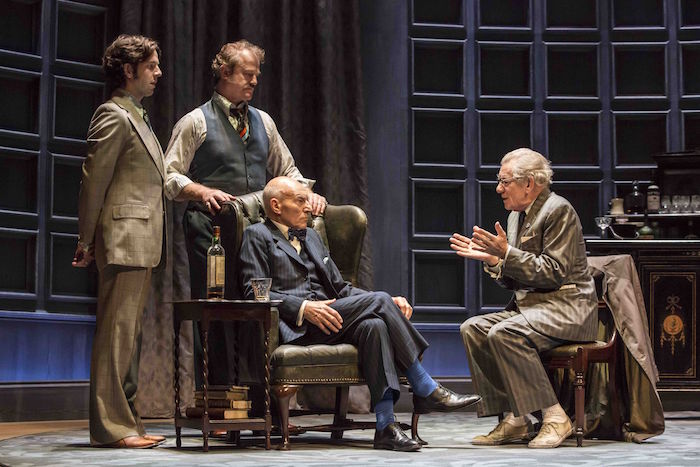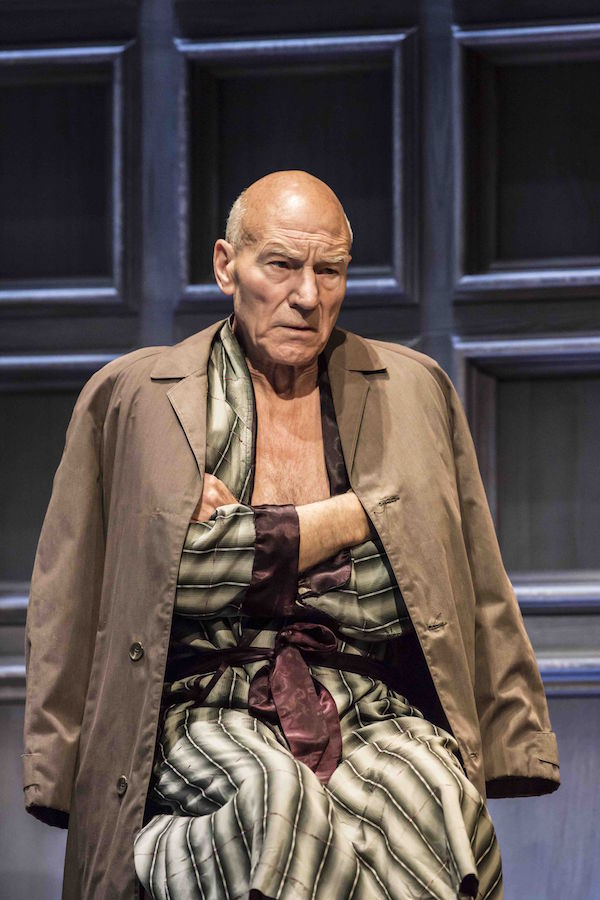No Man's Land, Wyndham's Theatre | reviews, news & interviews
No Man's Land, Wyndham's Theatre
No Man's Land, Wyndham's Theatre
McKellen, Stewart and Pinter combine for a haunting, unmissable production

We are lost in the wood. In the limbo state between dream and reality, memory and present, youth and age, companionship and seclusion, life and death, struggle and success, fame and obscurity. Pinter often visits that place of in between, but the elusive and haunting No Man’s Land – electrifyingly presented by two of our greatest thespians – dwells deep within it.
There’s a primal power to Sean Mathias’s staging of this absurdist work (returning to the site of its 1975 premiere), with projection designer Nina Dunn's whispering trees conjuring dark fairy tales as our introduction to this strange land. Well, it’s theoretically Hampstead, but the where is as much a question as the when, the who and the why. Are we really in the sumptuous home of eminent man of letters Hirst (Patrick Stewart), attended by faithful servants (Owen Teale and Damien Molony), or is this a warped family, a prison, a hospital, somewhere far beyond the physical or the earthly? (The quartet pictured below)
 The looming, murky canopy, in place of a ceiling, is eerily juxtaposed with Stephen Brimson Lewis's period-perfect but funereal interiors. This, it is chillingly intoned, is a place “which never moves, which never changes, which never grows older, but which remains forever icy and silent”. It’s the Narnia eternal winter, the purgatorial trap into which impish interloper Spooner (Ian McKellen), a down-at-heel poet, may fall as he tries to ingratiate himself with his plummy host.
The looming, murky canopy, in place of a ceiling, is eerily juxtaposed with Stephen Brimson Lewis's period-perfect but funereal interiors. This, it is chillingly intoned, is a place “which never moves, which never changes, which never grows older, but which remains forever icy and silent”. It’s the Narnia eternal winter, the purgatorial trap into which impish interloper Spooner (Ian McKellen), a down-at-heel poet, may fall as he tries to ingratiate himself with his plummy host.
Yet this is also a wonderfully witty production, alert to Pinter’s skewering of social codes, conversational tics, performative masculinity and studied national identity. From cricket, Oxford and country houses to “Did you have a good war?” and serving tea and toast on the lawn, it’s the conjuring of a bucolic, upper-crust England that never really existed, wistful nostalgia founded on a fictional construct. There’s also a different kind of coding, left lingering, in Spooner’s teasing, “Do you often hang about Hampstead Heath?” All that’s left to these men is language, and each word – and, naturally, pause – is weighted accordingly.
“His story will be different,” says Briggs of his fellow servant as he spins a yarn, but there’s no such thing as truth in this stubbornly cryptic piece. The cunning blagger Spooner gladly assumes whatever character works to his advantage – whether university pal, fellow poet or boon companion – and shrugs off those that don’t. Perhaps he frequents the local pub with his elite literary society; perhaps he just wipes down the glasses.
 The whole quartet, but particularly the two knights, excel in these layered verbal power games. They question one another’s fabrications or challenge their rivals to embellish further, pile on the names and status symbols and tales of shocking sexual exploits – shattering the veneer of class-conscious civility. Spooner and Hirst might really be acquainted, they may be alter egos, or they may just be strangers engaging in charged linguistic jousting.
The whole quartet, but particularly the two knights, excel in these layered verbal power games. They question one another’s fabrications or challenge their rivals to embellish further, pile on the names and status symbols and tales of shocking sexual exploits – shattering the veneer of class-conscious civility. Spooner and Hirst might really be acquainted, they may be alter egos, or they may just be strangers engaging in charged linguistic jousting.
McKellen and Stewart paired No Man’s Land with Godot in New York in 2013 before reviving it for this UK tour, and there’s a poetic strain of philosophy in their reading that makes Pinter a natural partner to Beckett. The verbal gymnastics barely cover a clamouring futility (“I have known this before”), and there’s an underlying panic to the men’s desire to hold onto a sense of self – their golden youth, work, family and that alien species: women. Yet they are “drowning”, another word carefully chosen and sadly appropriate given the level of habitual booze consumption.
McKellen’s Spooner – believable in every guise, from loquacious literary patron to grasping chancer – always keeps one eye on the bottle, cradling Scotch like a baby or chewing it with reverence usually reserved for the communion wafer. There is an exquisite physical precision to Mathias’s production matching that of the beautifully spoken dialogue (it's worth booking just to hear Gandalf’s spluttered “repellent lick-spittling herd of literati”). McKellen rolls onto tiptoes in his scuffed tennis shoes, slides, creeps, tips, leans, and sells his declarations with dancing wrists and a coquettish incline of the head.
If alcohol makes Spooner pitch and sway like a boat, it freezes the limbs of Stewart’s Hirst (pictured above right), who clutches the arms of his chair for support or keels over like a felled tree. He swaps taciturn resignation for raging against his frailty, piteously declaring “I’m in the last lap of a race I had long forgotten to run”. Yet he can still smoothly assume the part of the erudite patrician. The mention of “doctor’s orders” suggests a degree of senility – the question is whether we are observing it or inhabiting it with him, à la Florian Zeller’s The Father.
There’s superb support from Molony in the familiar Pinter role of garrulous aggressor and Teale as his gruffer counterpart in lurking menace: the yapping and growling attack dogs respectively. Vital contributions, too, from Adam Cork, whose sound design is restrained yet chilling. It’s suffused with melancholy, a ghost story for the long, wintry nights ahead, and a production showcasing a superlative pair of actors that will long echo in the mind. Unmissable.
rating
Explore topics
Share this article
The future of Arts Journalism
You can stop theartsdesk.com closing!
We urgently need financing to survive. Our fundraising drive has thus far raised £49,000 but we need to reach £100,000 or we will be forced to close. Please contribute here: https://gofund.me/c3f6033d
And if you can forward this information to anyone who might assist, we’d be grateful.

Subscribe to theartsdesk.com
Thank you for continuing to read our work on theartsdesk.com. For unlimited access to every article in its entirety, including our archive of more than 15,000 pieces, we're asking for £5 per month or £40 per year. We feel it's a very good deal, and hope you do too.
To take a subscription now simply click here.
And if you're looking for that extra gift for a friend or family member, why not treat them to a theartsdesk.com gift subscription?
more Theatre
 Ragdoll, Jermyn Street Theatre review - compelling and emotionally truthful
Katherine Moar returns with a Patty Hearst-inspired follow up to her debut hit 'Farm Hall'
Ragdoll, Jermyn Street Theatre review - compelling and emotionally truthful
Katherine Moar returns with a Patty Hearst-inspired follow up to her debut hit 'Farm Hall'
 Troilus and Cressida, Globe Theatre review - a 'problem play' with added problems
Raucous and carnivalesque, but also ugly and incomprehensible
Troilus and Cressida, Globe Theatre review - a 'problem play' with added problems
Raucous and carnivalesque, but also ugly and incomprehensible
 Clarkston, Trafalgar Theatre review - two lads on a road to nowhere
Netflix star, Joe Locke, is the selling point of a production that needs one
Clarkston, Trafalgar Theatre review - two lads on a road to nowhere
Netflix star, Joe Locke, is the selling point of a production that needs one
 Ghost Stories, Peacock Theatre review - spirited staging but short on scares
Impressive spectacle saves an ageing show in an unsuitable venue
Ghost Stories, Peacock Theatre review - spirited staging but short on scares
Impressive spectacle saves an ageing show in an unsuitable venue
 Hamlet, National Theatre review - turning tragedy to comedy is no joke
Hiran Abeyeskera’s childlike prince falls flat in a mixed production
Hamlet, National Theatre review - turning tragedy to comedy is no joke
Hiran Abeyeskera’s childlike prince falls flat in a mixed production
 Rohtko, Barbican review - postmodern meditation on fake and authentic art is less than the sum of its parts
Łukasz Twarkowski's production dazzles without illuminating
Rohtko, Barbican review - postmodern meditation on fake and authentic art is less than the sum of its parts
Łukasz Twarkowski's production dazzles without illuminating
 Lee, Park Theatre review - Lee Krasner looks back on her life as an artist
Informative and interesting, the play's format limits its potential
Lee, Park Theatre review - Lee Krasner looks back on her life as an artist
Informative and interesting, the play's format limits its potential
 Measure for Measure, RSC, Stratford review - 'problem play' has no problem with relevance
Shakespeare, in this adaptation, is at his most perceptive
Measure for Measure, RSC, Stratford review - 'problem play' has no problem with relevance
Shakespeare, in this adaptation, is at his most perceptive
 The Importance of Being Earnest, Noël Coward Theatre review - dazzling and delightful queer fest
West End transfer of National Theatre hit stars Stephen Fry and Olly Alexander
The Importance of Being Earnest, Noël Coward Theatre review - dazzling and delightful queer fest
West End transfer of National Theatre hit stars Stephen Fry and Olly Alexander
 Get Down Tonight, Charing Cross Theatre review - glitz and hits from the 70s
If you love the songs of KC and the Sunshine Band, Please Do Go!
Get Down Tonight, Charing Cross Theatre review - glitz and hits from the 70s
If you love the songs of KC and the Sunshine Band, Please Do Go!
 Punch, Apollo Theatre review - powerful play about the strength of redemption
James Graham's play transfixes the audience at every stage
Punch, Apollo Theatre review - powerful play about the strength of redemption
James Graham's play transfixes the audience at every stage
 The Billionaire Inside Your Head, Hampstead Theatre review - a map of a man with OCD
Will Lord's promising debut burdens a fine cast with too much dialogue
The Billionaire Inside Your Head, Hampstead Theatre review - a map of a man with OCD
Will Lord's promising debut burdens a fine cast with too much dialogue

Add comment